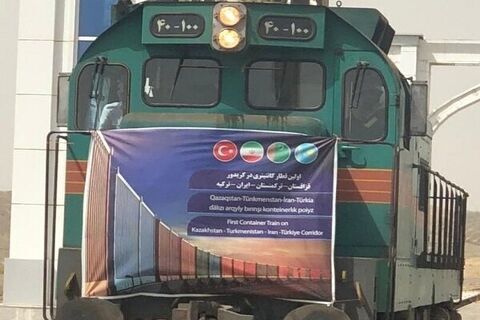The transit train arrived in Iran from the Incheh Borun Border carrying Kazakhstan's sulfur cargo to the destination of Europe.
Considering the recent limitations which Russia faces with its European borders amid the war, there have been serious attempts to activate the East-West Corridor by Turkey, Iran, and Kazakhstan through the Trans-Caspian International Transport Route (the Middle Corridor) instead of the Trans-Siberian route with 150000 TEU capacity annually.
Alternatively, as a substitute railroad route, the 'Kazakhstan-Turkmenistan-Iran-Turkey' Corridor through Iran is launched faster and cheaper than the sea-rail corridor from Kazakhstan to Turkey.
Earlier Kazakhstan transited cargo through the Caspian Sea from Aktau Port to Azerbaijan and Turkey via Baku-Tbilisi-Kars Railway.
So Iran welcomes activation of the southern part of the East-West Corridor via multimodal transit of rail and road that is more economical.
Moreover, a multimodal transport can run between Iran and Kazakhstan from Aktau Port to Amirabad Port in Iran and then by rail network through Iran whether heading to Turkey or the south.
Previously in May, the Islamic Republic of Iran Railways hosted Kazakhstan Deputy Prime Minister, and his delegation during which the two sides signed the preliminary instructions for rail transport cooperation. This was a prelude to the railway cooperation agreement to be signed by the Presidents of Iran and Kazakhstan, Ebrahim Raisi and Kassym-Jomart Kemelevich Tokayev, during their current official visit to Tehran.
By this agreement, it is expected that the China-Kazakhstan-Iran-Europe railway corridor will be an alternative to the China-Russia-Europe railway corridor.
Concurrent with these attempts, Iran Minister of Transport and Urban Development, Rostam Ghasemi, met with Director-General of the Secretariat of the Intergovernmental Commission (IGC) Transport Corridor Europe-Caucasus-Asia (TRACECA), Assavbayev, on June 13 to confer on increasing transit and modifying the road tariffs among TRACECA member states.
In the meeting, Ghasemi pointed to the specific geopolitical peculiarities of each member-state, and said the combination of multimodal infrastructures and interactions can facilitate regional transport.
Transit route through East-West Corridor and Iran is emphasized by Kazakhstan and freight transfer is already negotiated with Kazakh companies through this link, Assavbayev said.
Director-General of TRACECA Secretariat said once the agreement between Iran and Kazakhstan is signed, "we can take advantage of Iran's transport potential in transit".
Last year Iran's President and his Kazakh counterpart held talks on the sidelines of the Shanghai Cooperation Organization (SCO) in Dushanbe.
3266**2050
Follow us on Twitter @IrnaEnglish



Your Comment